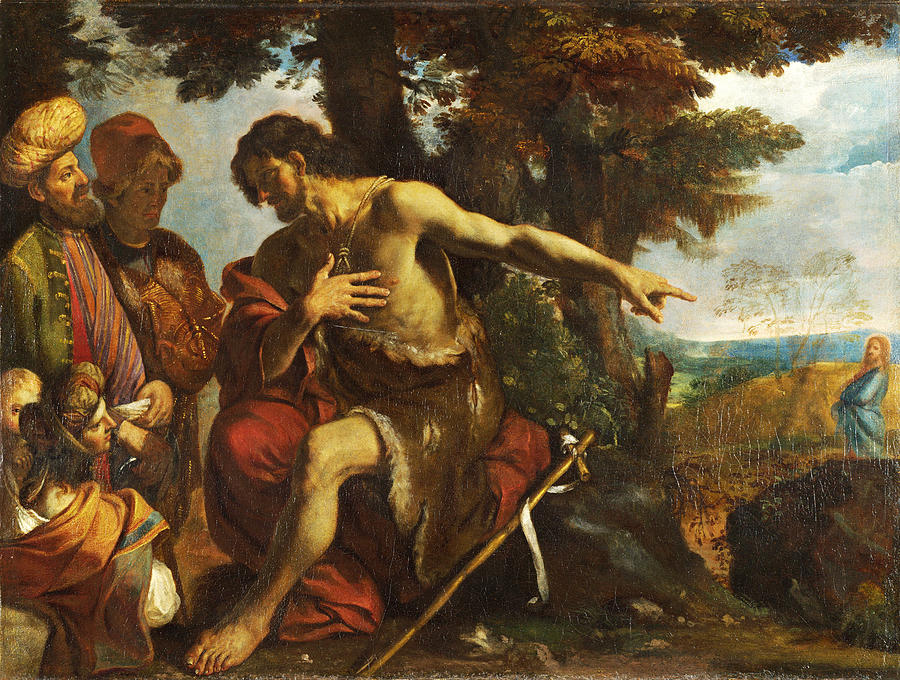For 500 years before Christ, the voice of prophecy bad been silent in Israel.
When John the Baptist appears, dressed like the ancient prophets and coming out of the desert, there is great excitement. That is why the Gospels say that “all Jerusalem” goes out to him. the prophetic voice was heard again. He not only denounced people for their evil deeds but he challenged them to pursue higher things. Thus, we see people of every class and rank show up on the riverbanks. He is giving a traditional washing, so that people both repent of their sins and at the same time are cleansed spiritually and physically.
Even more exciting for these huge crowds, he not only came out of the desert after years of lonely spiritual formation for his role to prepare the way of the Lord but there is “one greater to come.” Thus when Jesus begins His mission, people are prepared to hear his words, hoping that is not only the greater one but also the messiah. John and points beyond himself. He did not wish to bring attention to himself; but to prepare people for the one who was to come — Jesus, the Messiah. This is why he not only points to Jesus literally and figuratively, but when they finally meet as adults, he proclaims Jesus as the Lamb of God who takes away the SIN of the world. The people of the world will be delivered from the curse of original sin through this Lamb who will be sacrificed for them on Passover.
John’s preaching was the same message Jesus would frequently repeat: “Repeat and believe the Gospel” that is, believe in the good news being given to you.

But obviously he continued his apostolate of preaching since John fearlessly denounced evil wherever he found it. He’ rebuked Herod the King for contracting an evil and unlawful marriage. This of course is his downfall. He criticized the Sadducees and Pharisees, the religious leaders of Israel, for focusing too much on rituals and rules and not enough on God’s awesomeness, love and enormous mercy. His preaching sweeps all of Palestine, creating not just enthusiasm but repentance and a return to seeing the rules of the Law as a key to be united with the Holy One through prayer and personal sacrifice. The church calendar honors him marking his conception, his birth, and his death. The only other people in that category are Christ and Our Blessed Mother.
In Luke’s Gospel account, Mary, pregnant with Jesus, went to visit her relative Elizabeth, who was six months along in her pregnancy with John. At Mary’s greeting, Elizabeth was “filled with the holy Spirit” (1:41) and her unborn son “leaped for joy” (v. 44) in her womb. Both Elizabeth and her child were responding to the awesome reality of being in the presence of God in the flesh. Another translation is that the child rose in order to worship Jesus in Mary’s womb. John even in the womb recognizes who his cousin is and will become. We know that babies in the womb respond to sounds, their parents’ voices, music, all kinds of things. This baby recognizes God Incarnate. It fulfills what Saint Gabriel said to Zechariah earlier in Luke: the child would be “filled with the holy Spirit even from his mother’s womb” (Lk 1:15).
So why today for his birth? June 24 was eventually chosen as the date for the solemnity because Scripture tells us that John was conceived six months before Jesus (see Lk 1:36). Presumably, then, John was born about six months before Christ, and Christ’s nativity was celebrated on Christmas Eve, Dec. 24. John was the herald of Christ. So he cannot have a perfect pregnancy, and thus he is born one day short of nine months.
We are not all called to such a life of heroic holiness, of going out into public and proclaiming the truth of the gospel and the truth of the Church’s teachings in the magisterium. We are called to be living witnesses to those around us in how we speak, what we do, and how we behave with others. John is an excellent intercessor specifically for that. He criticized the crass drive for wealth and power that had engulfed so much of the upper classes, a world not unlike our own. He was poor and simple – we do not have to wear camel’s hair and live in the desert. We are called to decide what is important in our lives, and then follow through. We are called to witness to others as best as we can that we are We are called to pray for others, for the conversion of sinners, the return of those who have wandered away from Christ, for healing of our country and its leadership. Above all, we are called to live as children of God and loyal Catholics.

Leave a comment